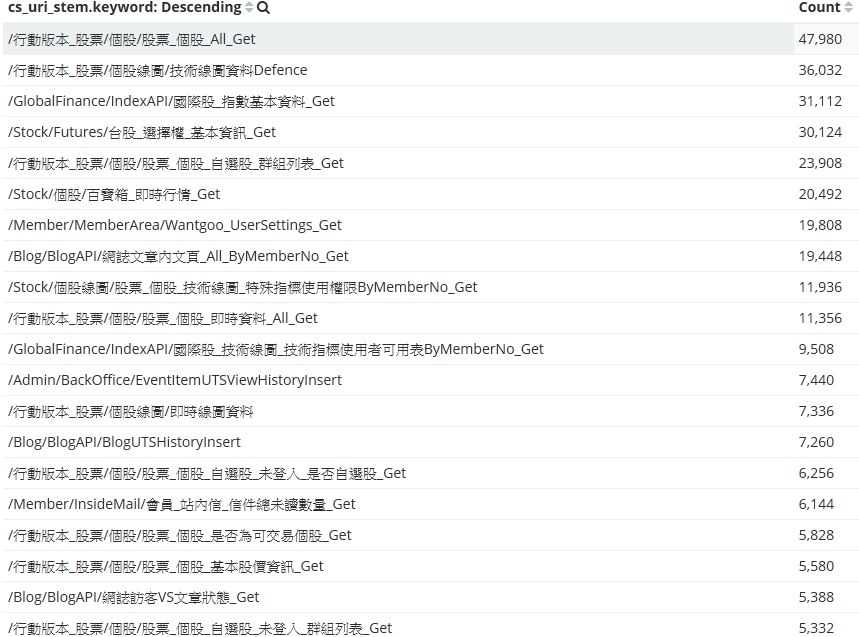ELK-IIS
- Category: 電腦相關
- Last Updated: Wednesday, 21 December 2016 15:50
- Published: Wednesday, 14 December 2016 09:27
- Written by sam
For ELK and IIS
Here is result
And you can use kibana visualize to count.
This is my IIS log sample.
Especially, you need pay attention to the line 4 (Fields).
#Software: Microsoft Internet Information Services 8.5
#Version: 1.0
#Date: 2016-12-13 20:00:00
#Fields: date time cs-method cs-uri-stem cs-uri-query c-ip sc-bytes cs-bytes time-taken
2016-12-13 20:00:00 GET /js/facebook/FacebookPixelCode.js - 61.228.217.134 716 1008 31
2016-12-13 20:00:00 GET /js/facebook/LinksGetStats.js - 61.228.217.134 550 1004 31
2016-12-13 20:00:00 GET /css/blog/alertify.css versionParams=2016-1212-003 61.228.217.134 4207 1040 31
2016-12-13 20:00:00 GET /css/widget/alertify.css - 112.118.199.37 92 1304 46
2016-12-13 20:00:00 GET /DynamicFiles/DoDataSourceTxt/useDataJs.js v=5951 61.228.217.134 2036 1024 31
2016-12-13 20:00:00 GET /DynamicFiles/DoDataSourceTxt/useDataJs2.js v=5951 61.228.217.134 363 1025 46
Below is my nxlog config for iis
<Input iis_1>
Module im_file
File "F:\IIS_Log\Default\W3SVC3\u_ex*.log"
ReadFromLast True
SavePos True
Exec if $raw_event =~ /^#/ drop();
</Input>
And logstash config
input {
tcp {
port => 9527
type => "iis"
}
}
filter {
grok {
match => ["message", "%{TIMESTAMP_ISO8601:iis_time} %{WORD:cs_method} %{URIPATH:cs_uri_stem} %{NOTSPACE:cs_uri_query} %{IPORHOST:c_ip} %{NUMBER:sc_bytes} %{NUMBER:cs_bytes} %{NUMBER:time_taken}"]
}
date {
match => [ "iis_time", "YYYY-MM-dd HH:mm:ss" ]
target => "iis_time"
timezone => "Etc/UCT"
}
mutate {
convert => ["sc_bytes", "integer"]
convert => ["cs_bytes", "integer"]
convert => ["time_taken", "integer"]
}
geoip {
source => "c_ip"
}
}
output {
elasticsearch {
hosts => ["localhost:9200"]
}
}

